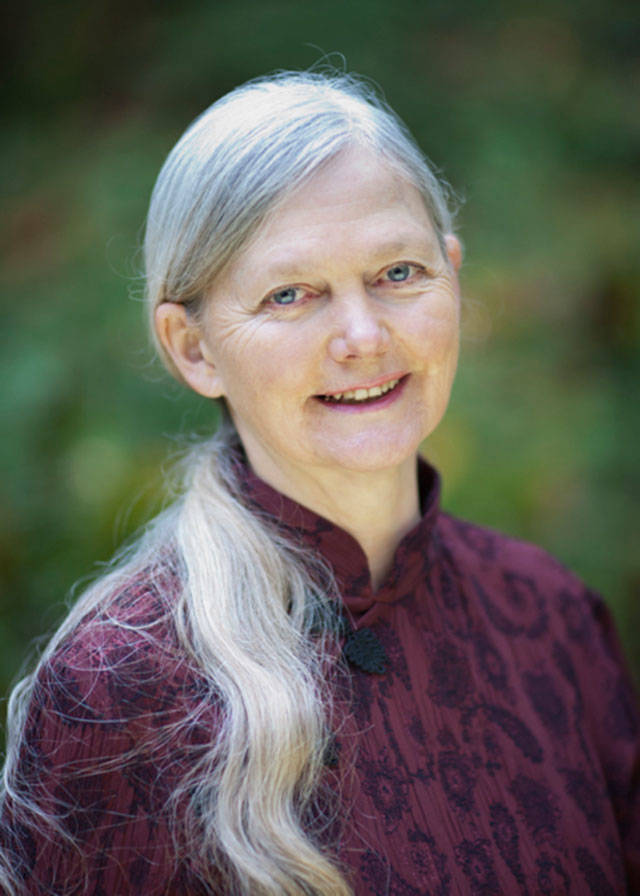The ASPCA’s Animal Poison Control Center handled 180,639 cases in 2016 and nearly 10 percent were identified as being caused by toxins in garden products, rodenticides or insecticides. Next Thursday, islander and gardener Diane Emerson will present Pets and Pesticides, a talk about how to keep animals safe from pesticide products.
Emerson has more than 30 years of organic gardening experience and 17 years of work in the specialty chemical industry. She has been working for years with her husband Michael Laurie and the Vashon community to reduce the use of pesticides to protect the island’s water supply, and the health of humans, pets and wildlife. Her Thursday talk is sponsored by both the Vashon-Maury Island Groundwater Protection Committee and Vashon Island Pet Protectors.
“The reason we’ve chosen to give this talk is to continue the efforts to have people use non-toxic ways to take care of their gardens and their pets,” she said Monday.
In her presentation, Emerson explains that pesticide is a broad term that includes insecticides, herbicides, rodenticides and slug/snail poisons which have all become common household items. While the EPA regulates these poisons and studies their effects on humans and on the target species, their effects on household pets are not required to be tested. And pets can become sick not just from coming into contact with the poison itself, but from touching or eating an animal that has become exposed to the poison.
“It keeps spreading and it keeps killing,” Emerson said before giving the example of anticoagulant rat poison and a curious pet finding and eating that rat. The poison could be transferred with devastating effects. More than 5 percent of the ASPCA’s Poison Center calls were due to rodenticides.
Emerson’s recommendation: a product called Rat-X that is made from salt and corn gluten. It kills rats by means of dehydration but is harmless to humans and pets. But Emerson said the best and most humane way to deal with rodents and other pests is to create an environment that is not welcoming to them.
“Traps can be much faster and much more humane, but better yet is to do things that don’t encourage them: seal up holes and don’t leave food out,” she said.
But lawn care products (weed-and-feed) are Emerson’s main focus, especially those that contain 2,4-D (2,4-Dichlorophenoxyacetic acid), a herbicide that causes uncontrolled growth of some plant cells (broadleaf weeds), eventually killing them. But the negative effects of the herbicide on humans and the environment are just beginning to be studied. The Natural Resource Defense Council (NRDC) reports 2,4-D is “the most dangerous pesticide you’ve never heard of” and states that while evidence for 2,4-D’s connection to serious health problems is slowly mounting, but not yet conclusive, researchers have observed apparent links between exposure to 2,4-D and non-Hodgkin’s lymphoma and sarcoma. The herbicide was declared a possible human carcinogen in 2015.
But what has Emerson and many others even more concerned is 2,4-D’s ability to stay in the environment and spread. According to NRDC, depending on the formulation, it can drift through the air from the fields where it is sprayed or be tracked inside homes by pets or children. The Environmental Protection Agency has measured the chemical in groundwater and surface water, as well as in drinking water. According to Laurie, locally, research by the United States Geological Survey, the Washington State Department of Ecology and King County has found levels of 2,4-D, which is harmful to salmon, in some Puget Sound streams. The National Oceanic and Atmospheric Administration (NOAA) Fisheries found that herbicide products containing 2,4-D are likely to jeopardize the continued existence of all salmon species where it is used.
“It can also poison small mammals, including dogs who can ingest it after eating grass treated with 2,4-D,” a September 2016 NRDC story indicates.
Emerson’s goal is to spread the word about the potential dangers of toxins such as 2,4-D and offer alternatives.
“Partially it’s about letting people know which things are dangerous and the other part is saying, ‘Here’s what you can use,’” she said Monday. “It can be frustrating to not offer alternatives.”
When it comes to lawns, her advice is to create strong grass that can push out weeds, overseed lawns in the fall, add compost and “allow grass to be strong enough” to crowd out intruding plants. She said she hopes that there will eventually be an island-wide forum to talk about banning the sale and use of pesticides, but more education needs to be done first.
“I really want to focus on the alternatives,” Emerson said.
Pets and Pesticides
Emerson will discuss how to protect pets and the environment from harmful chemicals found in pesticides at 7 p.m. Thursday, Nov. 2 at the Land Trust Building on Bank Road. Admission is free. For more information about the event, Emerson and organic gardening, visitgardengreen.webs.com



